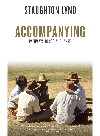
Accompanying
Pathways to Social Change
کتاب های مرتبط
- اطلاعات
- نقد و بررسی
- دیدگاه کاربران
نقد و بررسی

February 18, 2013
Lynd's poignant memoir of a life devoted to social justice is also a chronicle of the major social movements of the second half of the 20th century. He describes the slow process of coming to understand that real change cannot be imposed by organizers from the outside without committed people within each community. Lynd (Lucasville)tells of workers such as his friend, Ed, who reminds him that "the union's in the people." While working in the Civil Rights Movement, he admired how members of the Student Nonviolent Coordinating Committee practiced "accompaniment": living with and respecting the people they served. His chapter concerning the war in Vietnam leads to the example of El Salvadoran bishop Oscar Romero and the growth of his Liberation Theology, a Catholic movement promoting equality for the poor and indigenous. Despite resistance to his teaching, violence, and the murder of priests, Romero was made an archbishop in 1977, only to be assassinated in 1980. Lynd regards Romero's life as one of the best examples of accompaniment. Recently, Lynd and his wife, Alice, equally involved in this work, have been "accompanying" prisoners at a nearby penitentiary. Lynd closes with an account of the Occupy movement as a hopeful sign of equality and solidarity for a better world.

























دیدگاه کاربران